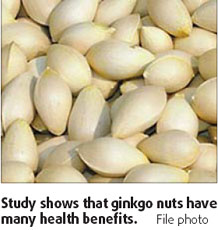Moreover, the extract from ginkgo leaves has in recent years become an increasingly popular alternative medicine supplement across the world.
 Typically it is used to protect against or treat dementia and Alzheimer's disease but it may also be prescribed for depression, anxiety, concentration problems, tinnitus and headaches.
Typically it is used to protect against or treat dementia and Alzheimer's disease but it may also be prescribed for depression, anxiety, concentration problems, tinnitus and headaches.
Anecdotal and historical accounts of the efficacy of ginkgo, especially in relation to dementia and Alzheimer's, abound but scientific evidence is far less conclusive. The Cochrane Database, a collaboration which carries out large systematic reviews of research trials, concluded in 2006 that ginkgo was safe to use for dementia and cognitive decline compared to a placebo, but that evidence that is has "predictable or clinically significant benefits is inconsistent and unconvincing".
In light of a dearth of well- designed studies, the National Center for Complementary and Alternative Medicine (US) is currently carrying out a large scale 8-year study involving 3,000 subjects due for completion in July 2009.
Meanwhile, there is one other thing to bear in mind. According to traditional Chinese medicine, ginkgo is considered an aphrodisiac and so it may be a useful addition to your store cupboard!
This nutrition-related column is written by Nina Lenton, a qualified dietitian living and working in Beijing. Contact her at nina_lenton@hotmail.com.
(China Daily September 24, 2008)